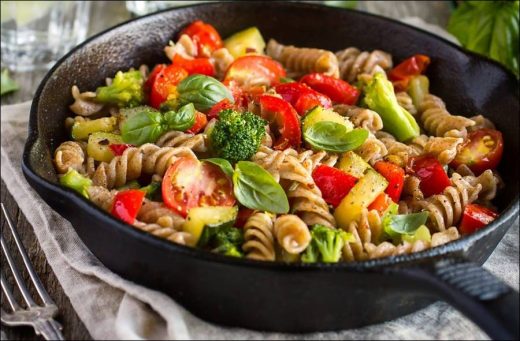How does food improve our mood? The link between food and our physical health is so well-documented that our understanding of which foods are ‘good’ and ‘bad’ for us is almost automatic. Until recently, however, there has been comparatively little research into the link between what we eat and our mental health. In The Food Programme, Sheila Dillon talks to chefs, doctors and mental health experts about the intimate link between food and mood. We find out more about how what we eat can both contribute to, and ward off, anxiety and depression.
Food for a good mood
When comedian Katy Brand feels low, her go-to cuisine is Italian. She says she opts for “those sorts of foods that seem to contain concentrated sunshine. I love tomatoes, peppers, olives that are just bulging with sunshine.”
According to Professor Felice Jacka, president of the International Society for Nutritional Psychiatry Research, there is now a decade of evidence of the association between dietary habits and common mental disorders, such as anxiety and depression.
Professor Jacka and her team conducted a three month-long trial which showed that helping people with their diet can lead to a profound improvement in their mental wellbeing. “What we saw was this very clear link between the extent to which they improved their diet, and the extent to which their depression improved” Professor Jacka says.
The research looks at diet as a whole, including dietary patterns and overall diet quality. She explains that Katy’s Italian food may be onto something too: “As it is in physical health, the Mediterranean Diet seems to be the king of the diets.” Pass the olive oil!
Bad mood food
If improving our diet can also improve our mood, is the opposite true too? Professor Jacka recounts that in animal studies, the consumption of a ‘Western-type diet’ high in saturated fats and added sugars impacts on an animal’s hippocampus and cognitive ability long before the animal starts to gain weight.
Diets such as these can be particularly damaging to adolescents and young adults. Psychologist and Great British Bake Off finalist Kimberley Wilson explains that adolescence is a huge period of change for the brain, which goes on developing until people are in their mid-twenties.
Kimberley explains that the period in which young people are likely to have the unhealthiest diet coincides with when “the brain is still growing and still has a really high nutrient demand”.
You are how you eat
The period of lockdown, and the constraints and isolation it brought, has undeniably impacted on the mental health of many people. At this time, it is not just what we eat, but how and when that can contribute to our mental wellbeing.
Planning meals in advance, going out for ‘one big shop’, and taking more time out of each day to prepare meals, can all help to add some structure, incentive and purpose to the day. This structure may in itself improve our sense of wellbeing. Ironically, however, this can be difficult for those who cook for a living.
As many as 8 in 10 chefs are said to experience poor mental health during their careers. Chefs Romy Gill, Ellis Barrie and Anna Haugh explain that their professional lifestyles are often not conducive to good dietary patterns.
Working long hours with short breaks and constantly tasting food mean that chefs can go entire days without eating proper meals. This, in turn, leads to a reliance on foods which can be prepared quickly after a long shift, but have little nutritional value. As we have seen, these are the types of food which impact on our cognitive ability.
A prescription for nutrition
While the food we eat affects our mental health, our mental health can also impact on our relationship with food. Although the routine of regular meals and a varied and healthy diet can help improve low moods, finding the energy and incentive to create these meals can be difficult if you are already mentally struggling.
Dr Rupy Aujla, founder of the UK’s first ‘culinary medicine’ course, takes this into account when considering how to use food to help his patients. Clinical consultations are short, and extensive dietary changes can be difficult to stick to, so he tries to identify just one simple way in which patients can improve their diets.
He asks: “What is that one meal we can do that only takes three or four ingredients and takes ten minutes?” It takes Dr Aujla just a couple of minutes to complete a dietary assessment and suggest one meal they could prepare, before writing it down like a prescription.
He might only expect his patients to cook one such recipe each week, but he asks them to consider how the food makes them feel and whether they gain satisfaction or accomplishment from the cooking process. As Dr Aujla says: “One simple thing at a time is sometimes lifechanging.”
Views: 348











